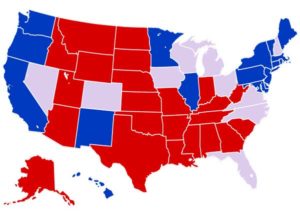Sales Tax Deduction Option, State and Local
[vc_row][vc_column][vc_column_text]
Sales Tax Deduction Option, State and Local
The Tax Relief and Health Care Act of 2006 extended the election to deduct state and local general sales taxes for 2006. The act was enacted after Schedule A (Form 1040), Itemized Deductions, and its instructions were printed. Because we were not able to include the instructions for figuring the deduction in the Schedule A instructions, we are providing this publication to help you figure this deduction.
You can elect to deduct state and local general sales taxes instead of state and local income taxes as a deduction on Schedule A. You cannot deduct both. To figure your deduction, you can use either:
- Your actual expenses, or
- The optional sales tax tables plus the general sales taxes paid on certain specified items.
IRS Publication 600, Optional State Sales Tax Tables, helps taxpayers determine their sales tax deduction amount in lieu of saving their receipts throughout the year. Taxpayers use their income level and number of exemptions to find the sales tax amount for their state. The table instructions explain how to add an amount for local sales taxes if appropriate.
Taxpayers also may add to the table amount any sales taxes paid on:
- A motor vehicle, but only up to the amount of tax paid at the general sales tax rate; and
- An aircraft, boat, home (including mobile or prefabricated), or home building materials, if the tax rate is the same as the general sales tax rate.
For example, the State of Washington has a motor vehicle sales tax of 0.3 percent in addition to the state and local sales tax. A Washington state resident who purchased a new car could add the tax paid at the general sales tax rate to the table amount, but not the 0.3 percent motor vehicle sales tax paid.
Taxpayers will claim the deduction on line 5 of Schedule A, checking a box to indicate whether the amount represents sales tax or income tax.
While this deduction will mainly benefit taxpayers with a state or local sales tax but no income tax — in Alaska, Florida, Nevada, South Dakota, Texas, Washington and Wyoming — it may give a larger deduction to any taxpayer who paid more in sales taxes than income taxes. For example, you may have bought a new car, boosting your sales tax total, or claimed tax credits, lowering your state income tax.[/vc_column_text][/vc_column][/vc_row]
Could “Red” States Actually Be Considering Tax Hikes?
Revamping the nation’s tax system is a very hot topic in Washington D.C. at the moment and that’s not going to change any time soon. One of the reasons Donald Trump was elected president was his stance on simplifying the country’s tax system and lowering the nation’s tax bill. This was a common theme…
Did I Accomplish All I Wanted?
Did I Accomplish All I Wanted? When you think about life, what do we have that comes of lasting value? Eventually, we go to the grave and the things that we acquire don’t go with us, but the memories that we leave behind and relationships with others will be long lasting. I recently had an interesting experience…
Important Tax Filing Deadlines You Don’t Want to Miss
Before you send in your tax return there are a lot of things you have to remember, which is why having a tax checklist is good idea. Of course, the right accountant will help you with that as well. However, before you ever get to that final point in the tax-filing process, you need to…
Which Tax Policy Issues Will Be Big in 2017?
Taxes, taxes, taxes. One could argue that 2017 will bring more changes to our country’s tax system and policies than we’ve ever seen before. The hope is that all that change will bring about better rewards, including a simplified tax return process and tax cuts for most, if not everyone. So as the New…




